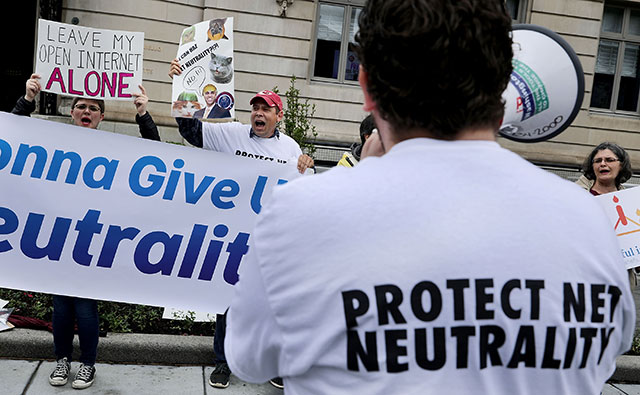
The internet may look a lot different on Wednesday, July 12. Web giants such as Facebook and Google are joining grassroots digital rights activists in an online “day of action” to challenge the Federal Communication Commission (FCC) proposal to gut its own net neutrality rules, which require big internet service providers like Comcast and AT&T to treat all data on their networks equally.
Across the internet, thousands of websites and apps big and small will display pop-ups, videos and alerts offering illustrations of what the internet could be like without net neutrality rules, and calling on web users to file comments with the FCC and join the protest:
Public outcry and mass digital activism pushed the FCC to adopt strong net neutrality rules back in 2015, when Democrats held a majority on the commission under the Obama administration, but a new Republican majority has moved quickly to repeal the rules since President Trump took office.
Republican FCC Chairman Ajit Pai’s plan to repeal the rules has united a “rag tag coalition” of grassroots internet activists, as organizer Evan Greer calls her closest allies, with big tech companies, such as Amazon and Netflix, as well as dozens of smaller firms and startups. Greer, a lead organizer for the digital rights group Fight for the Future, said mainstream media tend to focus on the big corporate names taking part in the online protest, but it was grassroots activists huddled over laptops in co-working spaces and coffee shops who came up with the idea.
Still, Greer said activists are glad to see that some of the internet’s largest websites — including Twitter, Netflix, OkCupid and Amazon — are taking a stand.
“In previous years, these companies have often been on the sidelines of these fights, so we hope that they plan to do something meaningful in the spirit of the protest and educate their users about what’s at stake if we lose net neutrality protections that protect our online free speech, and give them opportunities to take action,” Greer said on Friday after news reports indicated that Google and Facebook would participate in the day of action.
The coalition agrees that the FCC’s net neutrality rules are crucial for holding monolithic broadband companies accountable to consumers and preventing them from blocking or slowing access to parts of the web in order to maximize profit. The tech companies also have financial skin in the game: They fear that without net neutrality rules, internet service providers could charge them hefty fees to reach consumers with priority upload and download speeds.
Such “paid prioritization” schemes could give wealthy web companies an advantage over startups and independent sites that can’t afford to pay, but with so many internet heavyweights participating in Wednesday’s day of action, it’s clear that big content providers would rather operate under the FCC’s net neutrality protections than pay off broadband companies to hobble the competition.
While much of the net neutrality debate in the tech world has focused on the implications for popular websites, grassroots groups have emphasized the impact that a repeal of the rules could have on people of color, disabled people and other marginalized groups that rely on a free and open internet to fight for their rights in the public square and access information and economic opportunities.
Malkia Cyril, the executive director of the Center for Media Justice, said communities of color across the country “depend on an open internet to thrive.”
“From resisting police violence to demanding fair wages — the political voice and economic opportunity that the internet enables must remain protected by … net neutrality,” Cyril said in a recent statement. “Trump’s FCC seeks to wall these communities off from the power of the internet as a mobilizing tool and an equalizer.”
In the past, mass online days of action have stopped unpopular cyber legislation in Congress and rallied support for net neutrality that the Obama administration could not ignore. More than 5 million comments on the repeal plan have flooded the FCC’s inbox in recent months, and Wednesday’s day of action could spur thousands more. Not all public commenters support the rules, but members of Congress recently asked the FCC to investigate apparent spam bots that used real people’s names and addresses to file thousands of fake anti-net neutrality comments.
It’s unclear if this massive public response will cause Pai to have a change of heart. He has remained ideologically opposed to the FCC acting as a net neutrality watchdog for web companies and consumers, arguing that “light-touch” regulation of internet service providers would allow for more innovation and infrastructure investment. However, the day of action is expected to make clear that he is on one side of the debate, and a considerable chunk of the internet is on the other.
Comments on Pai’s plan to repeal the net neutrality rules will be collected at the FCC’s website until July 17.
Our most important fundraising appeal of the year
December is the most critical time of year for Truthout, because our nonprofit news is funded almost entirely by individual donations from readers like you. So before you navigate away, we ask that you take just a second to support Truthout with a tax-deductible donation.
This year is a little different. We are up against a far-reaching, wide-scale attack on press freedom coming from the Trump administration. 2025 was a year of frightening censorship, news industry corporate consolidation, and worsening financial conditions for progressive nonprofits across the board.
We can only resist Trump’s agenda by cultivating a strong base of support. The right-wing mediasphere is funded comfortably by billionaire owners and venture capitalist philanthropists. At Truthout, we have you.
We’ve set an ambitious target for our year-end campaign — a goal of $125,000 to keep up our fight against authoritarianism in 2026. Please take a meaningful action in this fight: make a one-time or monthly donation to Truthout before December 31. If you have the means, please dig deep.